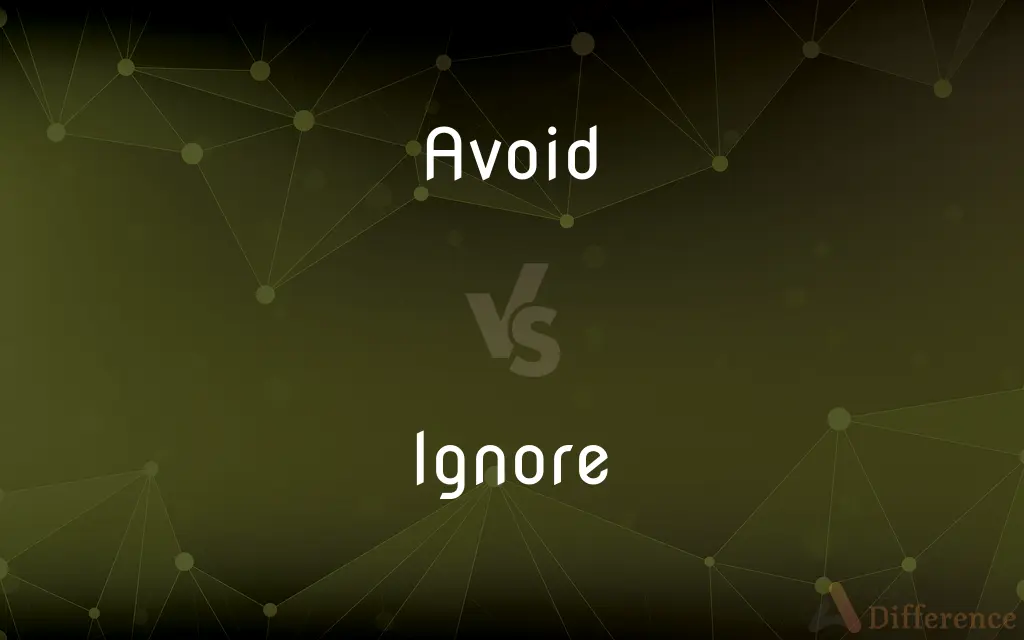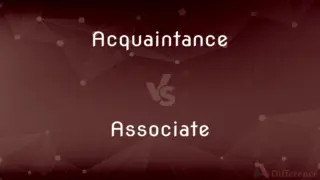Avoid vs. Ignore — What's the Difference?
By Tayyaba Rehman — Updated on September 26, 2023
"Avoid" means to deliberately stay away or refrain from something, while "Ignore" implies a refusal to acknowledge or the act of disregarding something intentionally or unintentionally.

Difference Between Avoid and Ignore
Table of Contents
ADVERTISEMENT
Key Differences
Avoid and Ignore are terms that represent two different types of responses to stimuli, situations, or interactions. To Avoid is to consciously steer clear of or abstain from something, be it a person, a place, an action, or a situation. It implies a deliberate effort to not engage or encounter the avoided object or situation. Ignore, on the other hand, is to refuse to acknowledge, to overlook, or to disregard. It represents a form of neglect or denial, often implying that the ignored object or situation is acknowledged but left unaddressed.
In usage, Avoid often implies an action or a conscious decision to stay away from possible harm, discomfort, or undesired situations. It could be seen as a proactive approach to prevent potential negative outcomes. Ignore is more passive; it’s the act of not responding to or acknowledging information, stimuli, or interactions that are perceived as insignificant, irrelevant, or inconvenient. While avoiding is more about prevention and precaution, ignoring is about indifference and neglect.
Avoid and Ignore, although different in their implications and applications, can sometimes overlap in casual conversation. For instance, one might avoid a person by staying away from places where an encounter is likely, or one might ignore a person by not responding to their attempts at communication, even if they are in close proximity. Avoiding suggests an acknowledgment of the existence of something and a conscious effort to stay away, while ignoring suggests a level of acknowledgment but a choice to not respond or engage.
Lastly, the concept of Avoiding usually implies a tangible and deliberate effort, a movement away from something, often driven by a clear motive or reason, such as fear, dislike, or avoidance of harm. Ignoring, however, is more intangible, it’s a mental act of dismissing or overlooking, which may or may not be driven by a clear motive. It can be a spontaneous act of indifference or a deliberate act of denial.
Comparison Chart
Part of Speech
Verb
Verb
ADVERTISEMENT
Meaning
To deliberately stay away from or refrain from something.
To refuse to acknowledge or to disregard something intentionally or unintentionally.
Nature
Proactive and tangible.
Passive and intangible.
Implication
Implies conscious effort and acknowledgment.
Implies neglect, disregard, or indifference, possibly without acknowledgment.
Context
More about prevention and precaution.
More about indifference and neglect.
Compare with Definitions
Avoid
To keep away from or abstain from.
To maintain good health, avoid excessive consumption of sugary foods.
Ignore
To deliberately overlook or disregard.
You can’t just ignore your responsibilities.
Avoid
To stay clear of; go around or away from
Swerve to avoid a pothole.
Ignore
To refuse to acknowledge or recognize.
It’s unhealthy to ignore your emotions.
Avoid
To take measures so as not to meet or see (someone)
"He never let go of the idea that she lived out there in order to avoid him" (Elizabeth Benedict).
Ignore
To dismiss as unworthy of attention or consideration.
People tend to ignore facts that contradict their beliefs.
Avoid
To prevent from happening
You can avoid illness with exercise and a balanced diet.
Ignore
To fail to consider or heed.
Don’t ignore the advice of experts.
Avoid
To refrain from using, engaging in, or partaking of
Avoid red meat.
Avoid risky behavior.
Ignore
To neglect or pay no attention to.
He chose to ignore the warning signs.
Avoid
To refrain from (doing something)
It was all we could do to avoid laughing at the remark.
Ignore
To refuse to pay attention to; disregard.
Avoid
(Law) To annul or make void; invalidate.
Ignore
To deliberately not listen or pay attention to.
A problem ignored is a problem doubled.
Avoid
(Obsolete) To void or expel.
Ignore
To pretend to not notice someone or something.
Avoid
(transitive) To try not to meet or communicate with (a person); to shun
Ignore
(obsolete) Fail to notice.
Avoid
(transitive) To stay out of the way of (something harmful).
I avoided the slap easily.
One town was flooded from the storm, while the other town avoided the storm.
Ignore
(obsolete) Not to know.
Avoid
To keep away from; to keep clear of; to stay away from
I try to avoid the company of gamblers.
Ignore
To be ignorant of or not acquainted with.
Philosophy would solidly be established, if men would more carefully distinguish those things that they know from those that they ignore.
Avoid
To try not to do something or to have something happen
Ignore
To throw out or reject as false or ungrounded; - said of a bill rejected by a grand jury for lack of evidence. See Ignoramus.
Avoid
To make empty; to clear.
Ignore
Hence: To refuse to take notice of; to shut the eyes to; not to recognize; to disregard willfully and causelessly; as, to ignore certain facts; to ignore the presence of an objectionable person.
Ignoring Italy under our feet,And seeing things before, behind.
Avoid
To make void, to annul; to refute (especially a contract).
Ignore
Refuse to acknowledge;
She cut him dead at the meeting
Avoid
To defeat or evade; to invalidate.
Ignore
Bar from attention or consideration;
She dismissed his advances
Avoid
To emit or throw out; to void.
Ignore
Fail to notice
Avoid
To leave, evacuate; to leave as empty, to withdraw or come away from.
Ignore
Give little or no attention to;
Disregard the errors
Avoid
To get rid of.
Ignore
Be ignorant of or in the dark about
Avoid
To retire; to withdraw, depart, go away.
Avoid
To become void or vacant.
Avoid
To empty.
Avoid
To emit or throw out; to void; as, to avoid excretions.
Avoid
To quit or evacuate; to withdraw from.
Six of us only stayed, and the rest avoidedthe room.
Avoid
To make void; to annul or vacate; to refute.
How can these grants of the king's be avoided?
Avoid
To keep away from; to keep clear of; to endeavor no to meet; to shun; to abstain from; as, to avoid the company of gamesters.
What need a man forestall his date of grief.And run to meet what he would most avoid ?
He carefully avoided every act which could goad them into open hostility.
Avoid
To get rid of.
Avoid
To defeat or evade; to invalidate. Thus, in a replication, the plaintiff may deny the defendant's plea, or confess it, and avoid it by stating new matter.
No man can pray from his heart to be kept from temptation, if the take no care of himself to avoid it.
So Chanticleer, who never saw a fox,Yet shunned him as a sailor shuns the rocks.
Avoid
To retire; to withdraw.
David avoided out of his presence.
Avoid
To become void or vacant.
Avoid
Stay clear from; keep away from; keep out of the way of someone or something;
Her former friends now avoid her
Avoid
Prevent the occurrence of; prevent from happening;
Let's avoid a confrontation
Head off a confrontation
Avert a strike
Avoid
Refrain from doing something;
She refrains from calling her therapist too often
He should avoid publishing his wife's memoires
Avoid
Refrain from certain foods or beverages;
I keep off drugs
During Ramadan, Muslims avoid tobacco during the day
Avoid
Declare invalid;
The contract was annulled
Void a plea
Avoid
To prevent from happening.
We can avoid many problems with clear and open communication.
Avoid
To refrain from doing.
He tries to avoid confrontation whenever possible.
Avoid
To consciously evade or shun.
She avoids crowded places due to her anxiety.
Avoid
To endeavor not to meet or face.
He avoids eye contact when he is nervous.
Common Curiosities
Does Avoid always imply a deliberate action?
Yes, to avoid generally implies a conscious effort to stay away from something.
Can you Avoid something without acknowledging it?
Avoidance usually implies some level of acknowledgment of what is being avoided.
Can Avoidance be a strategy?
Absolutely, avoidance can be a conscious strategy to prevent undesired outcomes or encounters.
Can one Ignore situations as well?
Yes, people can choose to ignore or overlook situations they find inconsequential or disturbing.
Can Avoiding be seen as a positive action?
It can be positive when it prevents harm or negative outcomes, but excessive avoidance can be problematic.
Can Ignoring be considered a passive action?
Generally, yes; ignoring is often seen as a more passive action compared to avoiding.
Does Ignoring always involve acknowledgment?
Not necessarily; something can be ignored either by overlooking it unintentionally or by consciously dismissing it.
Can Ignore be unintentional?
Yes, ignoring can be both intentional and unintentional, as one might overlook or disregard something without realizing it.
Can we Avoid situations?
Yes, people often avoid situations they find uncomfortable or risky.
Is it possible to Ignore something without being aware of it?
Yes, people can unintentionally ignore things they are not aware of.
Can you Avoid someone you don’t like?
Certainly, avoiding people one finds unpleasant is a common social behavior.
Share Your Discovery

Previous Comparison
Nebulizer vs. Humidifier
Next Comparison
Acquaintance vs. AssociateAuthor Spotlight
Written by
Tayyaba RehmanTayyaba Rehman is a distinguished writer, currently serving as a primary contributor to askdifference.com. As a researcher in semantics and etymology, Tayyaba's passion for the complexity of languages and their distinctions has found a perfect home on the platform. Tayyaba delves into the intricacies of language, distinguishing between commonly confused words and phrases, thereby providing clarity for readers worldwide.














































